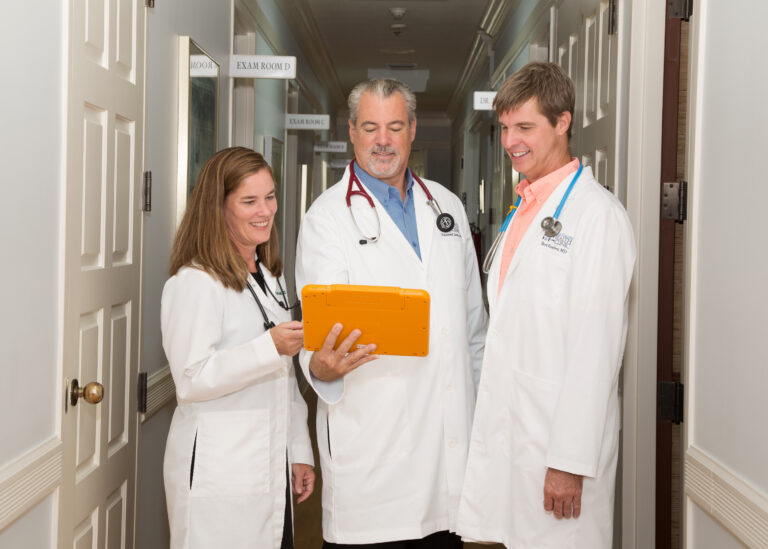
Ask a Doc: Kicking Colon Cancer in the Butt

According to the American Cancer Society, the lifetime risk of developing colorectal cancer is about 1 in 23 for men and 1 in 25 for women. The death rate from colorectal cancer has been dropping in older adults for several decades. Unfortunately, colorectal cancers now rank as the leading cause of cancer death in men under 55. This can – and should – change. Every March is National Colorectal Cancer Awareness Month, so Bret Kueber, M.D., Assistant Medical Director at the Boca Grande Health Clinic, is here to talk about colon cancer in this month’s Ask a Doc column.
Do you have a question for us? If so, please send questions to the Clinic at https://www.bghc.org/contact or to the Boca Beacon and we will answer them.
What is Colorectal Cancer?
Imagine your colon behaving like that one rebellious teenager who refuses to follow the rules, causing a ruckus in the peaceful neighborhood of your body. Colorectal cancer starts when cells in the colon or rectum throw a wild party and forget to stop multiplying. It’s not the kind of party anyone wants an invite to, believe me.
Who Gets Invited to This Party?
Colorectal cancer isn’t particularly picky about its guest list. This disease affects people of all racial and ethnic groups. Though it prefers the over-50 crowd, it’s been known to crash the parties of younger folks too. That’s why health guidelines recommend colon screening at age 45. If your family history reads like an invitation list (meaning relatives have had colorectal cancer), or your lifestyle includes more red meat than a barbecue competition, you might be at higher risk.
What Are the Party Favors?
Instead of leaving with a goody bag, you might notice uninvited gifts like changes in your bowel habits, blood in your stool (a definite party foul), abdominal discomfort, or unexpected weight loss. If your body starts giving out these party favors, it’s time to crash the party and call your doctor.
How Do We Crash This Party?
Bring in the ultimate party crasher: screening! Screening tests like colonoscopies are like having bouncers at the door, checking IDs and keeping unwanted guests out. They can spot those troublemaking polyps before they turn into full-blown cancer. Think of it as preventative party planning.
Several screening tests are available to find polyps or colorectal cancer. Talking with your doctor about your family history and your medical condition will help you decide which option is best for you.
- At-home Stool Tests – stool samples are collected at home and sent away to a lab for analysis. The Cologuard test detects the DNA and blood released from altered cells and can detect both precancer and cancer. A Fecal Immunochemical Test (FIT) is recommended annually, and Cologuard every three years if testing is negative. A positive Cologuard test results require a follow-up with a colonoscopy.
- Colonoscopy – a longer, thin, flexible, lighted tube is used to check for polyps or cancer inside the rectum and the entire colon. During the test, the doctor can find and remove most polyps and some cancers. Colonoscopies are also used to follow up on anything unusual found during one of the other screening tests. This procedure is done under a level of sedation or anesthesia that prevents you from feeling anything. This should be done every 10 years (for people who do not have an increased risk of colorectal cancer).
- Virtual Colonoscopy – a less invasive procedure, this is a special X-ray examination of the colon using low-dose computed tomography (CT). A radiologist reviews the images from the virtual colonoscopy to look for polyps on the inside of the colon that can sometimes turn into colon cancer. This should be done every 5 years.
What’s the Latest News on Treatments?
The treatment scene is buzzing with the latest trends. We’ve got surgery, chemotherapy and radiation therapy as the classic hits. But the real talk of the town is targeted therapy and immunotherapy, treatments that are like having the guest list so exclusive, that only cancer cells on the list get targeted. It’s personalized medicine at its finest, tailored to crash your specific cancer party without ruining the fun for the rest of your body.
Can I Avoid Being Invited?
While some invites are hard to turn down, you can definitely reduce your risk of attending this unwanted party. Eating a rainbow of fruits, vegetables and whole grains, dancing your way through regular exercise and avoiding smoking and heavy drinking are like telling cancer, “Thanks, but I’ve got better plans.”
Why Should I Care About Screening?
Because early detection is like arriving at a party early enough to choose the best snacks before anyone else! Catching cancer early means treatment is more likely to be successful, and who doesn’t love a good success story? According to the American Cancer Society, if caught early, your chance of survival is 91 percent.
While colorectal cancer might sound like a daunting adversary, and it’s certainly not to be treated lightly, remember that knowledge and timely screenings are our best weapons.
Do you have a question for us? If so, please send questions to the Clinic at https://www.bghc.org/contact or to the Boca Beacon and we will answer them.
More Recent Healthcare News

Every year we celebrate Doctor’s Day and Nurses Week, but there’s one more recognition event that’s just as important. Administrative Professionals Day is April 24th this year and I want to be sure to bring special attention to three incredibly special members of the Boca Grande Health Clinic family. Jonna Foos, Director of Operations Jonna […]

April, the birth month of James Parkinson, is Parkinson’s Disease Awareness Month. Parkinson’s is a degenerative syndrome that results in the gradual loss of brain circuitry involved in movement, thinking and behavior. According to the National Institutes of Health (NIH), the first clear medical description of Parkinson’s Disease as a neurological condition was written in […]

March 30th marks a special day on our calendar – Doctor’s Day! It’s a time to honor those who dedicate their lives to caring for us. At the Boca Grande Health Clinic, it’s the extraordinary team of board-certified physicians – Dr. Raymond A. James, our Medical Director; Dr. Bret Kueber, the Assistant Medical Director; and […]

Ask a Doc: Kicking Colon Cancer in the Butt
March 22, 2024According to the American Cancer Society, the lifetime risk of developing colorectal cancer is about 1 in 23 for men and 1 in 25 for women. The death rate from colorectal cancer has been dropping in older adults for several decades. Unfortunately, colorectal cancers now rank as the leading cause of cancer death in men […]

